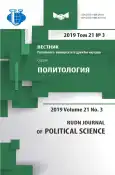Water Governance and Water Management Systems in the Tekeze River Basin
- Authors: Kumie G.A.1
-
Affiliations:
- Bahir Dar University
- Issue: Vol 21, No 3 (2019)
- Pages: 439-449
- Section: POLITICAL PROCESSES IN CONTEMPORARY WORLD
- URL: https://journal-vniispk.ru/2313-1438/article/view/339717
- DOI: https://doi.org/10.22363/2313-1438-2019-21-3-439-449
- ID: 339717
Cite item
Full Text
Abstract
The fact that a lot of fresh water resources in Ethiopia are shared between several sovereign states creates a difficult situation in terms of water governance and management. Since there is no central agency that can regulate the utilization of water, the autonomous riparian actors pursue their respective interests. Water is shared at local, national and international levels; and difficulty in water supply management arises from lack of coordination between local, national and international authorities. Most of the Ethiopian rivers are trans-boundary, i.e. shared by several sovereign states. The purpose of this paper is to examine water governance and management systems in the Tekeze River basin. The author uses the qualitative research method to critically examine the existing scarce literature sources and governmental policy documents. The findings of the study revealed the absence of any kinds of bilateral agreements among the riparian states of the Tekeze River basin. As the water governance system in the region is highly politicized, there exists a certain clash of interests between the Tekeze River nations. The constant conflict in the region disrupts cooperation needed for facility maintenance in the Tekeze River basin. The problems in the area arise due to the following factors: no demarcated boundaries between the basin states; no effective water governance system, and, as a result, no efficient and cooperative utilization of fresh water resources; lack of institutional and legal arrangements between the major riparian states.
About the authors
Getahun Antigegn Kumie
Bahir Dar University
Author for correspondence.
Email: getkumie@gmail.com
Lecturer and Researcher of the Department of Political Science and International Studies
Bahir Dar, EthiopiaReferences
- Arsano Y. Ethiopia and the Nile: Dilemmas of National and Regional Hydro Politics. Center for Security Studies, Swiss Federal Institute of Technology, Zurich, Switzerland. 2007.
- Fentaw F. et al. Climate Change Impact on the Hydrology of Tekeze Basin, Ethiopia: Projection of Rainfall-Runoff for Future Water Resources Planning. Water Conservation Science and Engineering. 2018; 3 (4): 267—278.
- Seyoum S. Hydropower of Ethiopia: Status, Potential, and Prospects. Mediaethiopia. 10.01.2009. Available from: www.mediaethiopia.com/hydropowerofethiopia.htm&ei. Accessed: 23.03.2017.
- Verhoeven H. Black Gold for Blue Gold? Sudan’s Oil, Ethiopia’s Water and Regional Integration Sudanese. Chatham House Briefing Paper. 2011.
- Dawit H. Ethiopian Energy Systems: Potentials, Opportunities and Sustainable Utilization. MSc. Thesis: Uppsala University; Sweden; 2010.
- Tekeze River Basin Integrated Development Master Plan Study. Main Report. Addis Ababa; 1998; Vol. I.
- Cascao A. Nile Water Governance. The Nile River Basin—Water: Agriculture, Governance and Livelihoods. 2012; 229—252.
- Cascão A. Ethiopia — Challenges to Egyptian Hegemony in the Nile Basin. Water Policy. 2008; 10 (2): 13—28.
- Betrie G. et al. Sediment Management Modeling in the Blue Nile Basin Using SWAT Model. Hydrology and Earth System Sciences. 2011; 15 (3): 807—818.
- Verhoeven H. The Politics of African Energy Development: Ethiopia’s Hydro-agricultural State-building Strategy and Clashing Paradigms of Water Security. Philosophical Transactions of the Royal Society A: Mathematical, Physical and Engineering Sciences. 2013; 371 (2002): 20120411.
- Hathaway T. What Cost Ethiopia’s Dam Boom? A look Inside the Expansion of Ethiopia’s Energy Sector’. International Rivers. February 2008. 26 p.
- Gebrehiwot Z. ‘Eastern African Power Pool: The EAPP Master Plan and Renewable Energy Options’. Paper presented at Executive workshop strategy to map out priorities for IRENA’s Africa Clean Energy Corridor Initiatives. Abu Dhabi, UAE; 22—23 June 2013.
- Ethiopian Water Resources Management Policy. Ministry of Water and Energy. Ethiopia: Addis Ababa; 1999.
- Trans-boundary Waters: Sharing Benefits and Responsibilities. United Nations Thematic Paper. 2008.
- World Water Assessment Program: National Water Development Report for Ethiopia. UNESCO. 2004.
Supplementary files









